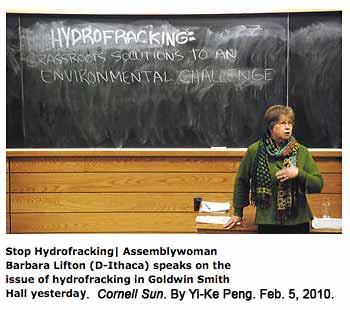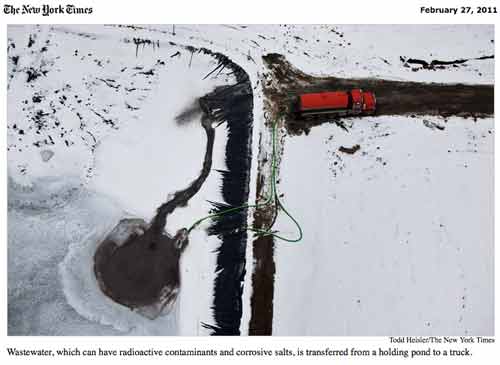Biblio
Raul Grijalva. January 19, 2006. The Nation. "Coming Clean and Green."
"Much of the progress made over the past four decades in protecting the environment has been reversed by the Bush Administration. Its priorities are clear: The interests of corporate contributors always trump the public's well-being."
This article appeared in the February 6, 2006 edition of The Nation. Raul Grijalva, Chair of the House Democratic Environmental Task Force, has represented Arizona's 7th District since 2003.
Abrahm Lustgarten of ProPublica takes FLYP readers on a journey through Sublette County, Wyoming to take a tour of the wells and hear the voices of residents and experts on the issue.
Anecdotal evidence has been criticized by Gas Industry advocates in the debate over the inadequately funded EPA study. There have been many anecdotal reports of fouled wells and air pollution, unknown risks to chemical exposure and hydrogen sulfide, and methane leaking from gas compressors captured on infrared film.
Cornell professor Robert Howarth has criticized claims that natural gas is "clean-burning". There have also been no studies on the cost benefits of gas drilling.
See: Drilling for Truth and other articles by Lustgarten.
Residents near gas leak still live in fear.
You never know from day to day what is going to happen," Mrs. McGee said of their situation. "You have no idea how a gas well will affect your life."
Everything now, from shopping to doctors' appointments and vacations, have to be planned around what is happening with the gas-level readings in their home, she said. "Our lives are not our own."
They have 100 percent readings of the lower explosive levels every week, Mrs. McGee said. They are being told they are safe, as long as the house is vented but are worried about what would happen if the vents accidentally are blocked, she said.
When the McGees first experienced what they call a "black goo" in their water, she said, "they tried to convince us it was perfectly normal."
The Rainforest Action Network and its blog, The Understory, have focused on issues that will intersect the concerns people have about gas drilling.
Their campaign to end mountaintop removal in West Virginia and their demands to protect Appalachia's drinking water in the face of the pressure of the mega-business in coal production, signals that the post-Bush era EPA may still be in the pockets of the Oil and Gas Industry. RAN activists Sit Down so EPA Will Stand up to King Coal.
With the nation’s eyes on the BP disaster, the EPA, without publicly announcing the action, recently gave the green light for a major new mountaintop removal coal mining permit in Logan County, West Virginia. The permit would allow the destruction of nearly three miles of currently clean streams and 760 acres of forest, in a county where at least 13 percent of the land has already been permitted for surface coal mining. This was despite EPA Administrator Lisa Jackson’s promise last April to enforce new rules to end the reckless practice of mountaintop removal mining.
Elizabeth Burns, 2008-2010. Texas blog updated frequently.
Covers a broad range of environmental topics related to mining and minerals. Her observations about her legal battles with Exxon Mobil are a must to read.
"This blog is a satire about life on a 38,000 acre ranch in the South Texas oilfield. ExxonMobil's eco-friendly tv commercials during the 2008 olympic games provoked me into action."
See personal video: Depraved Indifference. Jan. 3, 2010.
Chevron, Texaco and Exxon Mobil have left pits of burned chemical sludge across South Texas.
It was reported by Lowell Brown of the Denton Record Chronicle on April 23, 2010 that Range Resources had a spill of drilling mud in Denton, Texas. "Rayzor spill raises a stink. Residents cry foul; officials say mud dump an accident."
Sharon Wilson, Bluedaze blogger, has called this incident "Doodygate". The postings are listed with most recent on top, so to follow the postings, scroll down to the bottom and work your way up. At Bluedaze, click on the keyword, "Range Resources" to read more of her postings. Range is becoming more active, investing more money to acquire leases and develop drill sites in the Marcellus Shale.
Range Resources is an independent oil and gas company operating in the Southwestern, Appalachian and Gulf Coast regions of the United States. "The past five years, however, have represented a period of un- precedented growth. Our reserves have tripled, while our stock price has increased almost 1,000% on a stock-split-adjusted basis."
Christopher Helman. "Range Resources Is King Of The Marcellus Shale". Forbes Magazine. August 09, 2010.
The BP oil spill has created its share of victims, but it's creating opportunities for others. Among them, Range Resources ( RRC - news - people ), the Fort Worth, Tex. company that owns a big chunk of the gas-filled Marcellus Shale rock formation that stretches from New York across Pennsylvania and into West Virginia. With offshore drilling costs sure to go up and with spill liabilities unlimited, oil and gas finders are already looking to redirect capital spending to onshore plays. Range shares have doubled in five years, outpacing even Google but Chief Executive John Pinkerton says, "The bloom hasn't even opened yet."
The mission of the Red Lodge Clearinghouse is to support, connect and inform the partners of collaborative efforts and others addressing natural resource challenges in their community.
This blog features a page on Oil and Gas Resource Development that has many links to primary legal documents. It is based in the U.S. Western States.
Here is a link to their Staff listing:
We are Republicans. We share a deep concern for the environment.
We know that a healthy environment and a sound economy are both essential to our nation’s prosperity.
We believe that by working together, we can preserve both our environment and our economy
for current and future generations of Americans.
We Want:
Clean air and water
Food free from harmful chemicals
Clean, efficient businesses & industries
A high quality of life in our cities & rural communities
Strong, results-oriented enforcement of environmental laws
Economic development for communities without the ravages of sprawl
High priority for funding of natural resource stewardship & environmental protection
Protection for posterity of our national parks, forests, wildlife refuges, wild lands & waters
Effective legal protection for threatened & endangered plants & animals in their native habitats
We support and vote for Republican elected officials and candidates who share these values and concerns.

Riverkeeper is an independent, member-supported environmental organization founded on the premise that citizens themselves must roll up their sleeves to defend our waterways.
Riverkeeper’s mission is to protect the ecological integrity of the Hudson River and its tributaries, and to safeguard the drinking water supply of New York City and the lower Hudson Valley.
See: Gas Driling - Fracking photos on their Flickr site.
On July 8, 2010, Robert F. Kennedy Jr. gave a lunchtime speech at Energy Epicenter, the annual conference of the Colorado Oil and Gas Association. That speech provides a number of insights that are useful to those who are concerned about energy issues, concerned about the environment, and interested in the activities of power brokers who stand to make a great deal of money if important energy decisions favor their particular industry.
I wonder what he tells his ardent supporters in the environmental community who have been taught to believe that wind and solar energy are actually replacing fossil fuels? Does he tell them that utility scale wind and solar installations are simply a means to shift some of the market demand and profits away from the coal industry and to natural gas suppliers? Does he mention just how much natural gas is produced by the same large multinational companies that import most of our foreign oil and who pay little in the way of US taxes?
In the absence of federal policies that are protective of child development and the ecology of the planet on which our children's lives depend, we serve as our own regulatory agencies and departments of the interior...
Thoughtful but overwhelmed parents correctly perceive a disconnect between the enormity of the problem and the ability of individual acts of vigilance and self-sacrifice to fix it.
Environmental awareness without corresponding political changes leads to paralyzing despair...We feel helpless in our knowledge, and we're not sure we want any more knowledge.
You could call this well-informed futility syndrome. And soon enough, we are retreating into silent resignation rather than standing up for abolition now.
--Sandra Steingraber. Raising Elijah. 2011.
"We shouldn't wreck this place down, right, Mom?"
--Elijah, age six,the author's son.
“Eco-biologist, cancer survivor, activist, mother of two, and author of books about environmental hazards and their effects (including Living Downstream and Having Faith), Steingraber applies her knowledge and philosophy to the challenge of raising children in our toxic, climate-threatened world. She connects many child health issues, including asthma, behavioral problems, intellectual impairments, and pre-term birth to hormone-disrupting, brain-damaging, and otherwise dangerous environmental factors. Chapters tackle weighty problems–diminished fertility; how chemicals infiltrate mothers’ milk; air quality and the ozone hole; neurotoxicology; hydraulic fracturing–and how they affect children and families. Two major themes emerge: first, current environmental policies must change to safeguard and support the health of children and, second, we must end our dependence on toxic fossil fuels. Less a guidebook for conscientious parents than an alarming and sobering human rights polemic, the book’s narrative is nevertheless a persuasive, personal call to action.” —Publisher’s Weekly
See: Living Downstream: An Ecologist's Personal Investigation of Cancer and the Environment
See: Mira's Story: My Amazing Daughter's Fight Against Cancer
See: Poisoned profits : the toxic assault on our children
See: The Case for a Truth and Reconciliation Commission on Toxic Hazards
See: Fracking: Implications for Human and Environmental Health
See: Food and Water Watch
...the relatively new drilling method — known as high-volume horizontal hydraulic fracturing, or hydrofracking — carries significant environmental risks.
It involves injecting huge amounts of water, mixed with sand and chemicals, at high pressures to break up rock formations and release the gas.
With hydrofracking, a well can produce over a million gallons of wastewater that is often laced with highly corrosive salts, carcinogens like benzene and radioactive elements like radium, all of which can occur naturally thousands of feet underground. Other carcinogenic materials can be added to the wastewater by the chemicals used in the hydrofracking itself.
While the existence of the toxic wastes has been reported, thousands of internal documents obtained by The New York Times from the Environmental Protection Agency, state regulators and drillers show that the dangers to the environment and health are greater than previously understood.
The documents reveal that the wastewater, which is sometimes hauled to sewage plants not designed to treat it and then discharged into rivers that supply drinking water, contains radioactivity at levels higher than previously known, and far higher than the level that federal regulators say is safe for these treatment plants to handle.
Other documents and interviews show that many E.P.A. scientists are alarmed, warning that the drilling waste is a threat to drinking water in Pennsylvania. Their concern is based partly on a 2009 study, never made public, written by an E.P.A. consultant who concluded that some sewage treatment plants were incapable of removing certain drilling waste contaminants and were probably violating the law.
The Times also found never-reported studies by the E.P.A. and a confidential study by the drilling industry that all concluded that radioactivity in drilling waste cannot be fully diluted in rivers and other waterways.
But the E.P.A. has not intervened...
See: A Life’s Value May Depend on the Agency, but It’s Rising
Walter Hang said this about the NYT report:
"A 2008 drinking water crisis is documented that affected more than 850,000 residents along the Monongahela River near Pittsburgh. When New York imposed its de facto Marcellus Shale horizontal hydrofracturing moratorium, many firms went to drill in Pennsylvania.
Municipal treatment plants were accepting up to 40% of their influent as natural gas drilling wastewater even though they were not equipped to handle that type of waste. So much Total Dissolved Solids (TDS) pollution was discharged in the Monongahela River that the water became unpotable. A 70-mile stretch of the river was impacted."
Hang, Walter. “The New York Times Covers Marcellus Shale Gas Drilling Wastewater/Hold Onto Your Hats.” 2011-02-26 6:42 PM EST: n. pag. E-Mail.
See: Drilling Down | Documents: Natural Gas's Toxic Waste
See: Video: Natural Gas, Polluted Air
See: Interactive Map: Contamination
See: Graphic: Pulling Gas From Rock
Over the past nine months, The Times reviewed more than 30,000 pages of documents obtained through open records requests of state and federal agencies and by visiting various regional offices that oversee drilling in Pennsylvania. Some of the documents were leaked by state or federal officials. Here, the most significant documents are made available with annotations from The Times.
See: Ian Urbina. "Drilling Down Series Index." NYT. Feb. 27, Mar. 2, Mar. 4, 2011.
See also: Freedom of Information in the USA
See also: Do the natural gas industry’s surface water withdrawals pose a health risk?
See also: With Natural Gas Drilling Boom, Pennsylvania Faces an Onslaught of Wastewater
See also: WATER: Gas drilling in huge Appalachia reserve yields foul, briny byproduct - AP

See: Lifton, Barbara. The Assembly. State of New York. "Letter to Governor Cuomo re: Executive Order No. 41 and the Marcellus Shale DRAFT Supplemental Generic Environmental Impact Statement (DRAFT SeEIS), signed by 50 Democratic and Republican representatives." April 13, 2011.
We, the undersigned members of the New York State Legislature, write to thank you for signing a continuation of Executive Order No. 41 as one of your first official acts. That order requires your Department of Environmental Conservation (DEC) to: "analyze comprehensively the environmental impacts associated with high-volume hydraulic fracturing combined with horizontal drilling.." DEC is then required to revise its Marcellus Shale DRAFT SupplementalGeneric Environmental Impact Statement (DRAFT SGEIS) to address widespread criticism of the
original document...
…First, extensive new scientific and technical information has become available since the SGEIS proceeding began nearly three years ago. This includes data gleaned from more than 30,000 pages of documents recently brought to light by the New York Times in a three-part series. We request that you require a public comment period of no less than 30 days to afford interested parties an opportunity to identify sources of new natural gas drilling information that DEC should review in order to revise its DRAFT SGEIS.
...We request that you require the scope of the SeEIS to be expanded to include those issues and all other issues required to fulfill Executive Order No. 41.
The public should be allowed to comment on that matter.
In conclusion, you have repeatedly said you believe horizontai hydrofracturing of Marcellus Shale must only be allowed to proceed in New York State based on "good science." Our requests are entirely consistent with that policy.
See: New York State Assembly Passes Moratorium on Hydrofracking | Governor Vetoes Bill.
Two top House Republicans and the Senate’s leading global warming skeptic asked the Supreme Court Monday to throw out a lawsuit seeking to force electric utilities to slash greenhouse gas emissions.
House Energy and Commerce Committee Chairman Fred Upton (R-Mich.), his energy lieutenant Rep. Ed Whitfield (R-Ky.) and Sen. James Inhofe (R-Okla.) submitted an amicus brief Monday in the high-profile American Electric Power v. Connecticut case.
According to the American Journalism Review, Politico is a Washington, D.C. based website and newspaper that focuses on Beltway political coverage, started by veteran Washington Post political reporters John Harris and Jim VandeHei started in January 2007.
See: Glenn Greenwald. May 30, 2008. "The right-wing Politico cesspool". Salon.
I once thought that Politico would be a pernicious new addition to our rotted media culture. Instead, it actually provides a valuable service by packing every destructive and corrupt journalistic attribute, in its most vivid form, into one single cesspool.
See: Smackdown: climate science vs. climate economics
See: EPA in the Crosshairs | Mixplex
See: Beware The Green Dragon! | Right Wing Watch
See: Energy & Commerce Committee Investigates Potential Impacts of Hydraulic Fracturing
Government officials from around the world have recently declared that the risks of natural gas drilling are too great to allow it to proceed without additional analysis:
- The Town Council of Bartonville, Texas, in the Barnett Shale, voted to impose a 90-day moratorium on new permits for natural gas drilling and hydraulic fracturing in order to give the Council time to review the Town's regulations. They are particularly concerned about chemicals used in hydraulic fracturing.
- The Prime Minister of France ordered a national ban on shale oil and gas drilling until two separate government reports are published in June and there is more information available on the risks.
- The government of Quebec halted all shale gas drilling after an expert committee found that scientific data regarding the impacts of shale gas development are partial or non-existent. Quebec will be conducting its own in-depth analysis.
- The Maryland House of Delegates passed legislation that essentially halts any natiural gas drilling in the state until a two-year study on the risks is completed.
- Regarding the risks, In the second draft of a Health Impact Assessment of natural gas operations in western Colorado, public health experts concluded that: "Battlement Mesa residents will most likely be affected by chemical exposures, accidents/emergencies resulting from industry operations, and stress-related community changes." The experts provide more than 70 specific recommendations to address the potential impacts.
- And just yesterday, the City Council of Morgantown, West Virginia, passed a resolution demanding that acting Governor Tomblin convene a special legislative session to toughen regulations on natural gas drilling in the Marcellus shale field.
























